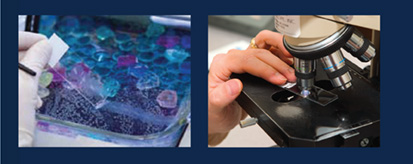
Dermatopathology is our Specialty
PROMOTIONAL FEATURE
It can be an excruciatingly long wait: for anyone having undergone a biopsy, the time between the procedure and the results can seem like an eternity – whether it’s two days or two weeks. It’s not unusual for patients to experience physical and emotional symptoms like lack of sleep, irritability or nervousness. It’s also not unnatural: fear and anxiety over the results can set the body’s nervous system on overdrive – releasing adrenaline and other stress chemicals into the bloodstream.
Doctors understand that patients waiting for a biopsy result are in this apprehensive state, so they want to assure them a rapid and dependable diagnosis. In Hampton Roads, for many physicians – particularly those who treat conditions of the skin – that means utilizing the diagnostic services of Dominion Pathology Laboratories.
 Founded in 2002 by Robert Frazier, MD and Kevaghn Fair, DO, Dominion Pathology Laboratories was at that time the only independent surgical pathology laboratory based in the Tidewater area. Both doctors had well-established careers in surgical pathology: Dr. Frazier at Virginia Beach General Hospital and Dr. Fair at Riverside Hospital in Newport News. They were familiar with the myriad challenges faced by pathologists working in busy hospitals, who must not only be familiar with the diseases of each organ system, but also able to communicate about them effectively with clinicians.
Founded in 2002 by Robert Frazier, MD and Kevaghn Fair, DO, Dominion Pathology Laboratories was at that time the only independent surgical pathology laboratory based in the Tidewater area. Both doctors had well-established careers in surgical pathology: Dr. Frazier at Virginia Beach General Hospital and Dr. Fair at Riverside Hospital in Newport News. They were familiar with the myriad challenges faced by pathologists working in busy hospitals, who must not only be familiar with the diseases of each organ system, but also able to communicate about them effectively with clinicians.
Pathology – the crossroads of all specialties.
“As hospital-based pathologists, on any given day we would converse with a pulmonologist about the results of his or her patient’s biopsy one minute; then discuss colon biopsies with a gastroenterologist next; then we’d talk to general surgeons about liver or pancreatic biopsies; or with gynecologists about their patients,” Dr. Frazier explains. “In the hospital setting a pathologist has to be proficient with the variety of problems in each specialty because they come up on a day to day basis.”
 Because of the ever expanding complexity and ongoing changes in every medical specialty, many pathologists choose to focus on and pursue additional training within the various subspecialties. Drs. Frazier and Fair, both fellowship trained in dermatopathology, opened Dominion Pathology Laboratories to allow them to put their specialized knowledge, training and experience to wider use. Their decision to form an independent laboratory was based on a shared mission of individualized service to area physicians who perform biopsies in their offices. These physicians are aggressively marketed by large-scale national laboratories for biopsy specimens but “because we are small and local we can provide accurate results quickly,” Dr. Frazier says, “and, more importantly, we can establish and maintain a more personal relationship with each physician and their office.”
Because of the ever expanding complexity and ongoing changes in every medical specialty, many pathologists choose to focus on and pursue additional training within the various subspecialties. Drs. Frazier and Fair, both fellowship trained in dermatopathology, opened Dominion Pathology Laboratories to allow them to put their specialized knowledge, training and experience to wider use. Their decision to form an independent laboratory was based on a shared mission of individualized service to area physicians who perform biopsies in their offices. These physicians are aggressively marketed by large-scale national laboratories for biopsy specimens but “because we are small and local we can provide accurate results quickly,” Dr. Frazier says, “and, more importantly, we can establish and maintain a more personal relationship with each physician and their office.”
It’s a mission that helped DPL grow over the last decade. In 2008, Michael Ryan, DO, a fellowship trained dermatopathology, joined the practice.
Such extensive training is important because of the nature of the work that dermatopathologists do. “Malignant melanoma is what we all worry about the most,” Dr. Frazier says. “It’s one of the most lethal of all the cancers, and survival depends almost entirely upon diagnosing and removing it early, before it can spread to other parts of the body – most commonly lymph nodes, lungs and the liver.”
But melanomas can be problematic to diagnose early since many of them are relatively slow growing. While more common skin cancers grow rapidly and noticeably from the beginning, some forms of melanoma are different. “Patients can literally have them for many years and hardly notice as they get almost imperceptibly larger,” Dr. Frazier notes. “They’ll see a little blemish or mole from its inception and think it doesn’t look that bad, but over the years, more and more mutations happen, making that lesion more and more malignant – and then at some point it just starts growing like gangbusters.”
It can also be a challenge to diagnose melanomas in their beginning stages since they can mimic benign moles, on the patient and under the microscope as well. There are numerous different criteria in the microscopic diagnosis of melanoma, Dr. Frazier explains, and obvious melanomas display nearly all of them. Less obvious melanocytic lesions will have some but not all– and then some may show only one or two; these cases can be the most difficult and frustrating because the stakes are so high. Malignant melanoma is responsible for more than 75 percent of all skin cancer deaths. And there isn’t one universal diagnostic criterion, such as a single gene mutation that positively identifies all melanomas.
That’s why it takes a trained and experienced eye to interpret the intricate patterns in ambiguous cases, and where a dermatopathologist’s fellowship training comes into play. “Fellowship is such a good place to learn,” Dr. Frazier explains, “because as fellows, you’re doing a lot of footwork for the leaders in the field. You’re allowing them to do research while you’re observing first-hand a lot of unusual cases that are often sent in consultation from other pathologists because of their difficulty.”
When a pathologist at DPL encounters such a problematic case, where the diagnostic criteria aren’t well represented or obvious, they confer with each other before reporting their findings. If a consensus of opinion can’t be reached, they consult experts elsewhere around the nation. “We’re on a par with the most sophisticated laboratories in the world,” Dr. Frazier says, “but at least once a month, we’ll need to send something to an acknowledged expert who has on-going research or is published on that particular problem” – simply because the stakes are so high. The bottom line in every case is, simply put, what is the best diagnosis.
But not all of their work involves potentially fatal skin disease.
In a good number of cases that they interpret, the doctors at Dominion Pathology Laboratories see less lethal cancers – but they emphasize that although death rates from basal cell and squamous cell carcinomas may be low compared to melanoma, these cancers can cause considerable damage and disfigurement if left untreated.
In other cases, the problem is dermatitis: a rash; an inflammatory process that may represent an underlying systemic disease or doesn’t respond to traditional treatment; sometimes a bacterial or fungal skin infection. Rashes can be difficult to tell apart clinically but the appearance and pattern of inflammation under the microscope can help narrow down the process, if not diagnose it outright. Here again, accurate reading of any biopsy is critical.
That’s why the doctors of Dominion Pathology Laboratories are excited about some of the advances in their field, particularly with regard to some of the newer techniques available now that more specifically confirm or eliminate potential diagnoses. They’re also observing research underway in academic medical centers with interest, such as in situ hybridization and other molecular biology techniques that can be performed on the very same specimen that the glass slides are made from, in order to identify certain gene mutations associated with Stage IV melanoma. “That technology will surely become more established in time, but it’s not yet ready for routine practice,” says Dr. Frazier, thankful that in Hampton Roads, a diagnosis of Stage IV melanoma is still relatively rare.
A consistent focus on service.
In the meantime, Drs. Frazier, Fair and Ryan focus on maintaining their reputation for unparalleled customer service. In an age when automated phone systems are the (exasperating) norm, callers are often surprised to be greeted by a pleasant, efficient human being who responds with the same care and professionalism that the pathologists do when they read slides. The doctors of Dominion Pathology Laboratories take pride in making themselves available to any physician who calls with a question or concern. After almost 15 years, they are unwavering in their mission to give the best service available to treating physicians.
“We know how anxiously patients are waiting,” Dr. Frazier says, “so our goal is always to get those critical results to their physicians as fast and efficiently as possible.”
For more information, visit our website: dominionpathology.com
733 Boush Street, Suite 200, Norfolk, VA 23510 (757) 664-7901

